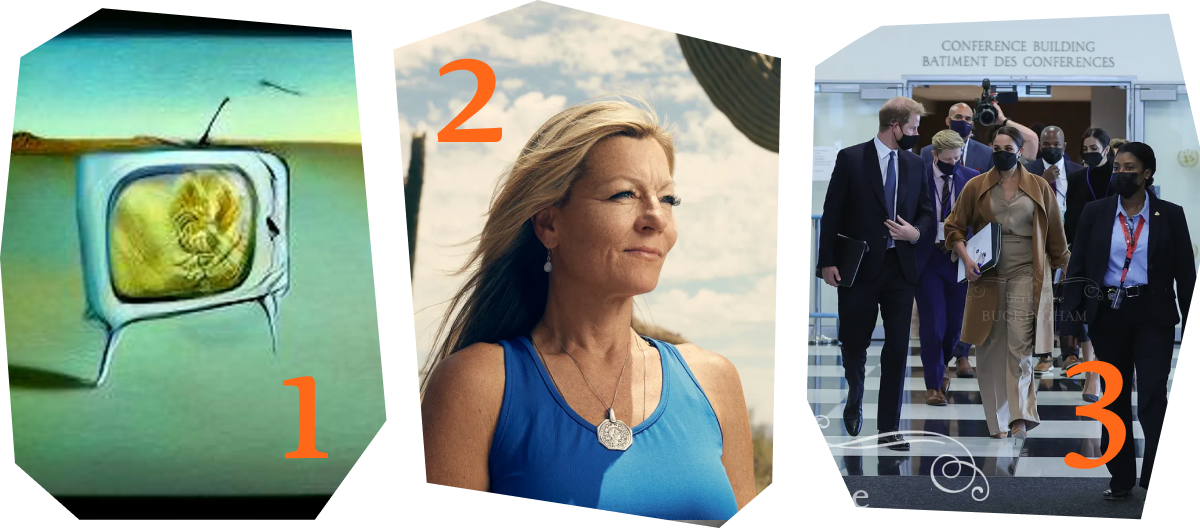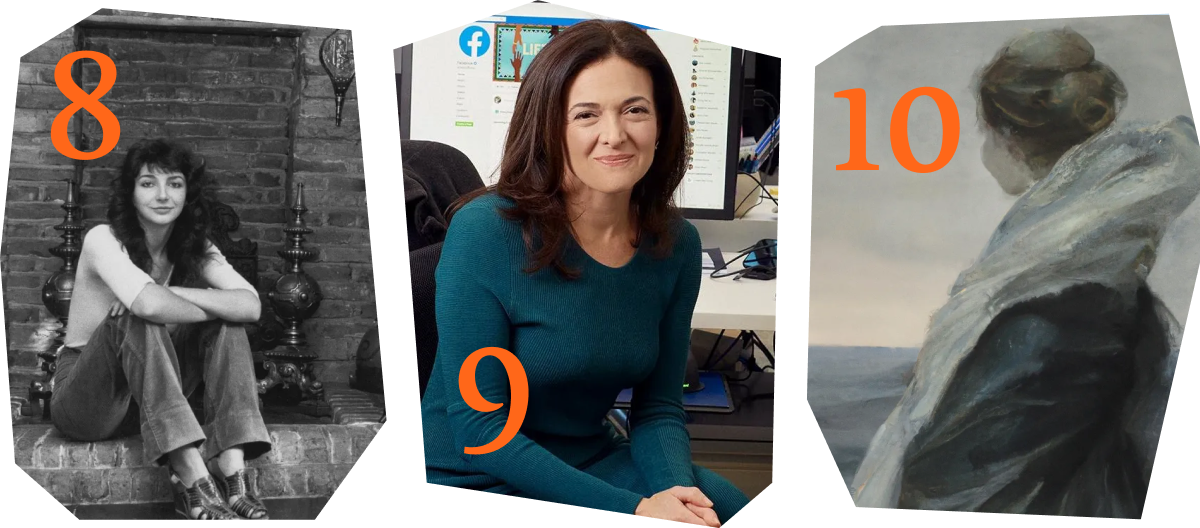Substack Reads: Your top reads of 2022, liberating Minecraft’s end poem, and disrupting Christmas
To kick off this week’s digest, we take a look at the top 10 most-clicked links shared over the course of this year in Reads.
This isn’t an exact science, but it’s a fun-enough proxy for the popularity of stories. And you are an eclectic bunch! Our top reads cover crime, technology, TV, and art, and they prove that, for better or worse, the world still loves a story about the U.K.’s royal family…
Thank you for being a reader here. We loved every moment of curating the Substack Reads weekly digest and look forward to plenty more in 2023!
Note: Substack Reads will be on a break over the festive season, returning to your inboxes in January 2023.
TOP READS OF 2022
1. How Netflix disrupted its own success
The streaming behemoth’s binge-watching formula has created a problem it can’t get out of
— DanT in
2. How an undercover exotic dancer helped capture America’s Most Wanted terrorists
Meet Rebecca Williams, the woman who spent five years infiltrating extremists
—
in3. Meghan Markle makes her (political) move
How a Vogue interview may reveal the Duchess of Sussex’s real ambitions
—
in4. Photographing the rituals of sexuality
Documentary and editorial photographer Dina Litovsky reveals the surprising significance of a familiar rite of passage: the bachelorette party
—
in5. Writing tips from one of the greats
In the week she joined Substack, the prophet of dystopia Margaret Atwood offers her “basic basics” home truths for budding writers. Given her more than 60 books and two Booker Prizes, aspiring novelists will want to take note
—
in6. The truth about The Great British Bake Off
Baker and author Edd Kimber lifts the lid on everything you wanted to know about the world’s favorite baking show, of which he was one of the first-ever winners
—
in7. The chess prodigy who cheated his way to the top
Andy Lewis hunts for overlooked treasures that could be optioned for film. In this week’s issue, he finds a story so good it’s practically gasping for celluloid
—
in8. What’s behind the great Kate Bush revival
A new generation of young people are discovering Kate Bush for the first time, and the reasons go deeper than Stranger Things, says author Angela Nagle
—
in9. Why the queen of Lean In is suddenly leaning out
As Mark Zuckerberg’s right-hand person, Sheryl Sandberg helped blaze a trail through Silicon Valley. Now she’s walking away from it all. Here, she tells Eleanor Mills why
—
in10. Why Netflix’s adaptation of Persuasion is a hate crime
A lesson in how to lose Austen fans and alienate the original text
— Brandon Taylor in
Becoming an archivist
Nature writer Janisse Ray was as surprised as anybody to be thrown the keys to her local archives and told she was now in charge of them. She reflects on what this experience has taught her about our rural communities and the role stories play in our present
—
in , recommended byThe Old Jail in my town is a two-story red-brick building whose front and only door opens into a small office. The office leads to a concrete fortress with bars on the windows and bars for walls. Jail cells, patented in 1874, were left downstairs, with lever-action doors that have been removed so that nobody plays a bad joke on someone. Inside the cells are metal cots.
Downstairs in the northwest corner, set in the ceiling, is a trap door made of metal, 3 feet square. It opens at the center with a lever, like a drawbridge, as if to pour out the contents of the upstairs into the cool air below. Upstairs there is no sign of a trap door. The floor has been covered in particle board, then painted gray.
This building is our local Archives.
GAMING
Liberating the ending to Minecraft from Microsoft
Writer Julian Gough wasn’t expecting his poem for Minecraft’s ending to be so loved and yet so overlooked. But the story of what happened, which left him reaping zero financial rewards from Minecraft’s success, is one about friendship. Prepare to get emotional
—
inSHORT, DRY VERSION
I wrote the End Poem for Minecraft, the most popular video game of all time. I never signed a contract giving Mojang the rights to the End Poem, and so Microsoft (who bought Minecraft from Mojang) also don’t own it. I do. Rather than sue the company or fight with my old friend, who founded the company and has since gone off the deep end, I am dedicating the poem to the public domain.
You’ll find it at the bottom of this post, along with a Creative Commons Public Domain dedication.
Anyone can now play with it. Have fun.
MORE EMOTIONAL VERSION
I wrote a story for a friend. But in the end, he didn’t treat me like a friend. And I’m hurt.
That’s the core of what I want to say. But because the story I wrote was the ending to a game that has sold two hundred and thirty-eight million copies and affected a lot of lives… I need to say a little more.
But that is the core:
I wrote a story for a friend. But in the end he didn’t treat me like a friend. And I’m hurt.
MUSIC
On the demanding loudness of Tár
For musicologist and writer Fran Hoepfner, the attention to detail in the score of the movie Tár is worth paying attention to, more so than your Spotify Wrapped playlist lets you believe
—
in
I learned about classical music through osmosis: I played instruments as a kid, and then as a teen, and then as a young adult, and the more I grew to understand a piece’s historical and contextual significance, the easier it got—well, not to play—but to understand why a piece was worthy of playing, what it meant. If you are an adult reading Fran Magazine, as Fran Magazine is a magazine for adults, basically, then it’s probably “too little, too late” in this regard. But you will have so much more success if you just start listening to classical music in any way you’re able to rather than scroll through the Tchaikovsky Wikipedia page or whatever. If you want a more concentrated project, you can pick a composer—any of the obvious ones (Bach, Mozart, Beethoven, Tchaikovsky, etc.) will do—and listen to as much of their work as possible. I can’t dictate your tastes when it comes to classical music any more than I could with regular music. Only you will be able to determine if you prefer Russian composers to German composers to American composers. Only you will be able to determine whether you prefer the sweeping overstatement of a symphony or the powerful singularity of a concerto. And you won’t know until you try it all.
My other advice when it comes to listening to classical music is to consider that perhaps what you perceive to be a natural aversion or disinterest comes from the fact that you have not heard it played loudly enough. This is one of the great benefits of a film like Tár: it is loud. Imagine that first Mahler 5 cue in the film, the way it bursts into the theater. That moment is frightening and demanding and incredible. Think, too, of Tár’s appearance at the performance of Mahler 5 toward the end. These scenes are powerful in part due to the volume of the music being played. I often find that this is true in my own listening. Take, for instance: Respighi’s Pines of Rome. I played this in my youth. It did nothing for me. I heard it in Fantasia 2000. It did nothing for me. I always thought, “Respighi, this is not one of my guys.” Back in October, I went to see the New York Philharmonic play Pines of Rome, and it felt like I had a chair pulled out from under me.
HOLIDAYS
Meet the 28-year-old CEO disrupting Christmas
The first visible change was the relocation of Christmas’s headquarters from its home in the North Pole to the heart of Silicon Valley. No one could predict what came after…
—
inIf this were anyone else’s office, you might find yourself lost in the view.
Situated on the 56th floor of a gleaming skyscraper in San Francisco’s Embarcadero district, the floor-to-ceiling windows open to a breathtaking vista of the bay, the water glittering far below and the fog-draped hills of the East Bay far beyond.
With the kind of vision on display inside, however, there’s little temptation to play sightseer here.
A shock wave rippled through the holiday industry earlier this year when control of Christmas was wrested from the hands of its longtime head, Kris Kringle, in a surprise hostile takeover. Business analysts were stunned by the acquisition, and more than a few passionate op-eds were penned decrying the move.
New CEO Brantwell Hask is undeterred by the criticism, though. He’s possessed by a vision to reshape the beloved holiday, and determined to see it through.
Listening to him describe this vision, it’s hard not to become a believer yourself.
Recently launched
I believe that Generative AI’s impact on society will be so profound that I conceive of it as a new stage in human evolution: ‘The Era of Generative AI.’
It will be an age where our understanding of human intelligence, creativity, and experience will go beyond the wildest reach of what we imagine possible today.
—
on the launch of her new Substack,Substack Reads is a weekly roundup of writing, ideas, art, and audio from the world of Substack. Posts are recommended by staff and readers, and curated and edited from Substack’s U.K. outpost by Hannah Ray.
Got a Substack post to recommend? Tell us about it in the comments.

















You’re the best source of objective journalism to be found today! Thanks for enlightening us daily!
Oh yay! I'm rounding up the 'best of' posts for my December newsletter, and will add this to the 2022 list. In the future, perhaps Substack can also do a year end "movers and shakers" type list, where you share the top 10 most subscribed newsletters in the network for that year?